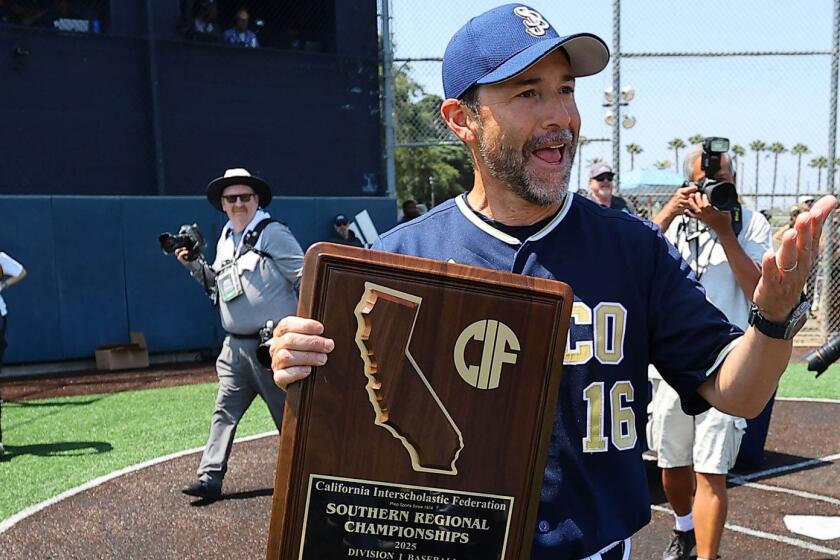‘Gramps’ Gives Winning Performance During Act II at Wyoming
- Share via
LARAMIE, Wyo. — What first made Paul Roach famous, sort of, was his idea of using life insurance policies to fund the athletic department.
He was executive director of the Cowboy Joe Club, Wyoming’s booster bunch, when he had the brainstorm, and it went something like this: A Cowboy Joe names the program as his beneficiary, he gets a tax deduction during the life of the policy, and upon it’s completion, he gets a plaque in the athletic department.
“So the family can come down and look at it,” Roach explains.
Roach pauses, looks down.
“I thought it was a hell of an idea,” he says. “But you know, there is some negative aspect to it, isn’t there?”
We take that to mean we’ve finally got a dead Cowboy Joe. Roach nods, trying to look very serious, and holds up one finger. “So then they wrote, ‘He’s got them dying for the Wyoming Cowboys.’ ”
What better cause, though. The ‘Pokes, as they are known hereabouts, are 11-1, after years of mediocrity and worse, and headed for a second consecutive appearance in the Holiday Bowl, where they will play Oklahoma State.
More than that, they are ranked No. 15 in the polls. They have become, of all things, a national presence.
And this has all happened since, and we have to believe because, Roach slid over from his caretaker’s duties with the booster club and became athletic director and then, not knowing whom to name coach in the face of another sudden departure, coach as well.
You could say this was an unlikely development. He was 60 at the time, and had been out of the football business for 7 years. Last time he was head coach was 1955, at Dickinson High School in North Dakota. The players called him Gramps behind his back.
They say there are no second acts in America, but Gramps is living one. A longtime assistant coach, first at Wyoming and other colleges, later in the National Football League, Roach had put aside his ambitions as much as Wyoming had put aside winning. But now Roach, a grim reaper in the athletic department, has breathed life into his own forgotten career and a program that has had 7 coaches in the last 17 years, only 4 of them winning ones.
Famous again.
You can never predict to whom or why good fortune will happen. In this case, the resurrection of Paul Roach, always a popular figure in Wyoming, ever since his days there in the ‘60s, was born of desperation. Not his, Wyoming’s.
The school trustees had just served as a reference for a coach with ambitions one more time. Guys like Bob Devaney, 5 seasons; Fred Akers, 2; Pat Dye, 1; and, most recently, Dennis Erickson, 1, have long used Laramie as a way station and the program was not prospering because of it.
So they considered their new athletic director. The trustees couldn’t be sure Roach would win, but the one thing they did know about Roach was, he wasn’t going anywhere. He was 60 years old.
“So they gave me a 3-year contract,” he says. “I guess they thought that would be a lifetime contract in my case.”
There is this morbid side to the guy, isn’t there?
Forgotten in all this success--the man has yet to lose a WAC game--is that Roach had everything to lose and Wyoming nothing by his embarking on this second career. Roach had been somewhat reluctant to jump from the booster club to the athletic director’s job as it was.
“That used to be a glamour job,” he says. “You play a little golf, things like that. But now with drugs, the increased responsibility for the girls, Title IX, it’s a lot more stressful. And, now to be a head coach as well? That trend of dual capacities went out the window about 15 years ago.
“And then to take on the coaching job, that’s kind of sticking your neck out, isn’t it? I mean, if you’re not all that successful as a coach, then that athletic director’s job is not so comfortable anymore. People get to thinking, all of a sudden, maybe you’re not that good an AD, after all.”
The trustees had to be persuasive, up to a point.
“The burning desire to be a head coach had passed me by 10, 12 years ago,” he says. “I’d had a couple of opportunities when I was here in the ‘60s but when I investigated them, they didn’t look that good. And when I went into the NFL, I kind of wrote it off altogether. I did interview for the Seattle job (coach of the expansion Seahawks) when I was at Green Bay. They said I was second. I guess they said that to everybody.”
Still, he says, “it was kind of enticing,” when the trustees put the idea forward. “There must have been some desire after all that time. And then my wife said, ‘Go for it.’ ”
On the other hand, when he phoned his 86-year-old mother with the news, she said, “You’re crazy. You always have been.”
“She’s pretty tough,” he says.
He had doubts even after taking the job, though.
“I didn’t mind laying it on the line for these people,” he says. “But there was a little risk factor, don’t you think?
“After spring practice, I certainly had second thoughts. Our final scrimmage, there were 19 sacks. That’s a lot. And if I had reservations about me, then so did the players and the staff. Here I was, 40 years older, out of football for several years.”
Maybe he was crazy. But in his debut, he rallied Wyoming to an easy win over Air Force, the first of his 16 consecutive WAC victories. The next 2 games were lost by a total of 11 points.
This was encouraging for most. But not his mother. He called her, and she snapped, “When are you going to hire a real coach?”
Neither Roach nor his mother really breathed a sigh of relief until the sixth game of the season, when BYU had his team down, 14-0, and the ‘Pokes rallied for 29 unanswered points and won.
“That changed the players’ attitude,” he says. “Instead of hoping something good would happen, they now believed something would. I couldn’t have screwed them up the rest of the way, yup. Even with the last 4 games on the road.”
The Roach approach has consisted of a blend of his professional and collegiate backgrounds. The word that comes up often in discussion of his players is businesslike.
“After a win, they sing a song, take a shower and be on their way,” he says.
But there is also a surprisingly modern way of dealing with college athletes. Surprising for a 61-year-old guy, anyway.
“You have to be honest with players these days,” he says. “It’s kind of my opinion the players are much smarter than 10-15 years ago. You can’t be so dogmatic and authoritarian.
“On our team we listen to the players, if they want to contribute during the game. If he comes to the sideline with something, we listen. We don’t believe everything that comes out of his mouth, but it is a more democratic approach. It’s different than when you just played and kept your mouth shut.
“I guess it’s ironic, but it’s true that a lot of coaches have failed because they couldn’t adjust, couldn’t cope.”
And the oldest of them has proven far more flexible than the youngest.
These are good times for Roach, lucky times. He finds it interesting that he got this job at a time of life when he can do it best.
“I don’t have a problem with the importance of the position, whereas I very well could have at 40,” he says.
“I know that I can take a greater satisfaction in seeing the players win and enjoy themselves than I probably could have at 40. For one thing, a 40-year-old coach is always looking ahead, what jobs are available. This is my last hurrah.”
Wyoming might not like to hear that, but they better not get too used to Roach. As long as it took him to get here, his stay may be quite brief. How long will he stay?
“Well, that’s kind of difficult for me to say,” he says. “If I say anything less than 4 years, that hurts recruiting.”
But he makes it plain that he is thinking considerably less.
“I get a lot of advice on this from other coaches,” he says. “They all say, ‘Don’t stay too long. Get out while it’s still positive.’ ”
Also, the burden of both jobs is just too much. What might have been an off-season last year was a season of attending to stadium and revenue details. Roach wound up with only a couple of days’ vacation.
“I just can’t do this,” he says. “You know the saying, don’t let them see you sweat? Well, I sweat.”
Although he looks lean and fit and describes his health as excellent, he understands how the job can age a man. And he’s in no hurry to get a plaque on the wall anytime soon. That kind of fame can wait.
More to Read
Go beyond the scoreboard
Get the latest on L.A.'s teams in the daily Sports Report newsletter.
You may occasionally receive promotional content from the Los Angeles Times.










